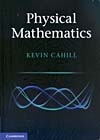- About MAA
- Membership
- MAA Publications
- Periodicals
- Blogs
- MAA Book Series
- MAA Press (an imprint of the AMS)
- MAA Notes
- MAA Reviews
- Mathematical Communication
- Information for Libraries
- Author Resources
- Advertise with MAA
- Meetings
- Competitions
- Programs
- Communities
- MAA Sections
- SIGMAA
- MAA Connect
- Students
- MAA Awards
- Awards Booklets
- Writing Awards
- Teaching Awards
- Service Awards
- Research Awards
- Lecture Awards
- Putnam Competition Individual and Team Winners
- D. E. Shaw Group AMC 8 Awards & Certificates
- Maryam Mirzakhani AMC 10 A Awards & Certificates
- Two Sigma AMC 10 B Awards & Certificates
- Jane Street AMC 12 A Awards & Certificates
- Akamai AMC 12 B Awards & Certificates
- High School Teachers
- News
You are here
Physical Mathematics

Publisher:
Cambridge University Press
Publication Date:
2013
Number of Pages:
666
Format:
Hardcover
Price:
85.00
ISBN:
9781107005211
Category:
Textbook
[Reviewed by , on ]
Allen Stenger
11/6/2013
This is a comprehensive and well laid out handbook of all the mathematics that physicists need to know. Very Good Feature: all the examples are real problems from physics. They are slanted toward particle physics, but cover most of mathematical physics.
It is marketed as a text for upper-division and graduate courses, but the exercises, although well-chosen, are sparse compared to the amount of material covered. I think it would work best as a handbook or supplemental work rather than the main text.
The coverage is well-balanced. The only conspicuous flaw is that it is skimpy on partial differential equations. The book covers the most common special functions of physics, but is not comprehensive even for those. There are no proofs, although some are requested in the exercises.
A somewhat similar book, although aimed at a different audience, is Kreyszig’s Advanced Engineering Mathematics. This covers a lot of the same material, but has much more extensive examples and exercises. Most of Kreyszig’s exercises come from physics, but it is an older physics than in Cahill, emphasizing mechanics and waves.
Allen Stenger is a math hobbyist and retired software developer. He is webmaster and newsletter editor for the MAA Southwestern Section and is an editor of the Missouri Journal of Mathematical Sciences. His mathematical interests are number theory and classical analysis. He volunteers in his spare time at MathNerds.org, a math help site that fosters inquiry learning.
Preface
1. Linear algebra
2. Fourier series
3. Fourier and Laplace transforms
4. Infinite series
5. Complex-variable theory
6. Differential equations
7. Integral equations
8. Legendre functions
9. Bessel functions
10. Group theory
11. Tensors and local symmetries
12. Forms
13. Probability and statistics
14. Monte Carlo methods
15. Functional derivatives
16. Path integrals
17. The renormalization group
18. Chaos and fractals
19. Strings
Index.
- Log in to post comments




